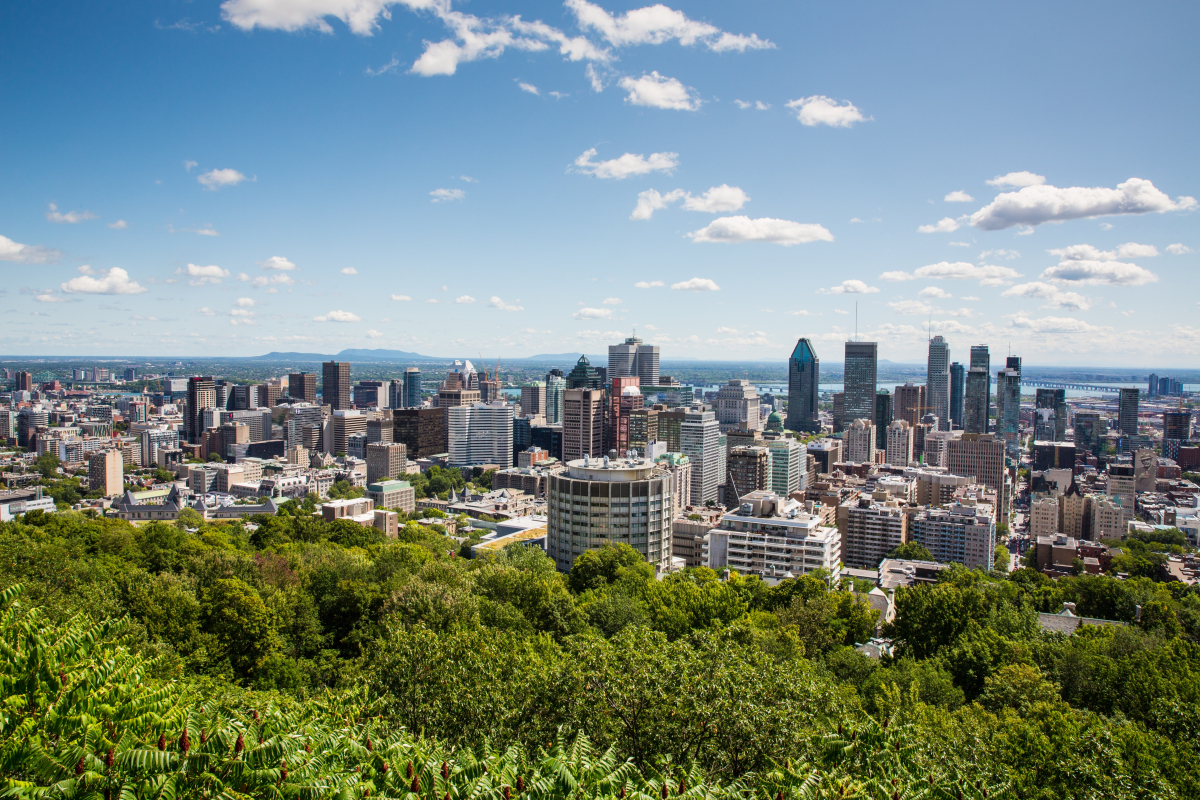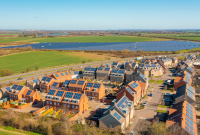Another Canadian city has taken the step to get natural gas, a planet-warming fossil fuel, out of buildings.
This week, Montreal announced it will no longer allow gas in new buildings of up to three storeys as of October 2024, and ban the fossil fuel as of April 2025 in larger new builds. The ban will include gas-based heating and hot water systems, as well as items like barbecues and stoves. In Canada, fossil fuel-based heating systems for furnaces and water in homes and buildings make up 13 per cent of the country’s total greenhouse gas emissions. The share hits 18 per cent if you include electricity for cooking, lighting and appliances.
Natural gas is made mostly of methane, which is responsible for approximately a quarter of global warming and is over 80 times more powerful than carbon dioxide (CO2) for the first 20 years it exists in the atmosphere. The production of natural gas is a huge source of methane leaks in Canada and the gas also produces CO2 when burned.
Natural gas has been the fossil fuel of choice in many North American homes since the 1940s. But recently, there has been a shift as cities make efforts to lower their carbon footprints and transition to heat pumps and other clean energy home heating options.
"This draft bylaw places Montreal at the forefront of North American cities committed to concrete climate action," said Marie-Noëlle Foschini, co-ordinator for the Sortons le gaz! Coalition, a group that advocates for the province to get off natural gas. Foschini said the move should inspire other municipalities in Canada to take on the challenge of decarbonizing their buildings.
This summer, Nanaimo, B.C. announced new buildings won’t be allowed to use natural gas as the primary heat source as of July 2024. Prévost, a town in Quebec with a population of around 12,000, voted in September to ban gas in new buildings and new gas appliances in existing buildings.
New York state is leading the way in America by eliminating gas hookups and gas use in new development statewide, following the lead of other U.S. cities such as Seattle. By the end of 2023, buildings shorter than seven storeys have to get off gas — larger buildings will have until 2027. With a population of almost 20 million, the commitment is a milestone in the energy transition.
Vancouver was on a similar path before its city council rejected the motion to ban natural gas hookups in new buildings in May.
Cities working towards natural gas bans have met with staunch opposition from industry lobbyists. In B.C., FortisBC (which provides most of the natural gas across the province) has lobbied municipalities and pitched the idea of "renewable natural gas," which is largely seen as a false solution and an industry attempt at greenwashing fossil fuels.
Alberta’s energy “war room” launched a cross-border political campaign targeting Nanaimo to reverse the move. The Canadian Energy Centre, which is a publically funded provincial corporation created by former Alberta premier Jason Kenney to protect and promote the fossil fuel industry, sent over 2,000 emails to Nanaimo city council urging its members to reverse the decision.
“Our community took action to reduce emissions in line with our climate goals by voting for zero-carbon construction — honestly, an easy action to take if we’re serious about taking responsibility for our fair share of the climate crisis,” said Nanaimo Coun. Ben Geselbracht.
“If the Alberta government thinks spamming councillors with blatantly climate-denying mail will make B.C. communities back down, they’re going to be very disappointed. This interference only strengthened our resolve.”
To Greenpeace Canada, Montreal’s ban signals another important move towards greening Canada’s buildings.
“The dominoes are beginning to fall as more and more cities are taking action to reduce emissions,” said Patrick Bonin, climate and energy campaigner at Greenpeace Canada.
“Montreal is showing how it can be done with its new gas prohibition. The provincial and federal governments need to wake up and follow its lead.”
— With files from Rochelle Baker
This article has been update to clarify that New York's gas ban applies to the entire state, not just the city.






Comments
Yeah! Go Montreal! (Boo Vancouver's new council for backing off)
good stuff Montreal!
Cities, for the better part, are light years ahead of senior governments on the climate file. And they accomplish that without a lot of help from senior governments.
One exception would be BC's Step Code, a provincial building code policy that is a game changer for conservation, efficiency and accommodation of renewables at the individual site level. The Step Code will, in part, will make up for Vancouver's new conservative council majority's intransigence on fossil fuels.
Urbanists have reiterated over and over how cities are short changed when it comes to apportioning tax revenue earned in cities fairly. Currently, cities receive just eight cents on every revenue dollar generated within their boundaries once the provinces and feds hoover up their gluttonous entitlement to 92%.
Yet cities are under the constitutional thumbs of the provinces who often choke municipalities on land use planning and electoral policy. Witness Doug Ford's shenanigans on the GTA greenbelt and the outright manipulation of council structure, or former BC premier Christy Clark's condescension towards Vancouver and its fellow Metro Vancouver municipalities, an attitude that cost her an election when nine urban ridings flipped the bird at her arrogance.
Trudeau was slightly more generous to cities than most of his predesessors, but that's not saying much as his standard promise the stars and get the moon rhetoric vs action deficit was measured.
Cities need a federal government that's actively engaged with their urban constituents. The flawed Constitution that gave power over cities to the provinces can, I believe, be challenged on that representation.
This needn't be a Supreme Court challenge; it could take the form of federal-municipal agreements on far more generous direct federal funding for transit, urban infrastructure and affordable housing in exchange for zoning policy that results in better quality at the human scale, more diverse and compact urbanism and new levels of energy efficiency.
It's too easy for the feds to throw their hands into the air and blame provinces for ignoring -- or abusing -- cities. Are there no federal urban ridings? Do federal voters in cities deserve to be ignored by the federal government they elected? Would they not respond in kind if federal initiatives brought deep, positive change to their communities?
Learn from Christy Clark: Ignore cities at your peril.
Because Chris Hatch included this story in his email newsletter this past weekend, I sent him an email reply, which I quote from, in part, here:
In the current newsletter, you were giving kudos to Valerie Plante for banning new gas hookups in Montreal. Well... OK... but surely you know that gas does not have a big market in Quebec, so such a commitment from the mayor doesn't mean all that much. (How about coverage of a plan to get Maritimers off of heating oil?)
"In Quebec, where electricity rates are among the lowest in Canada, more than two out of three households use electricity to heat their homes. More than one-third of dwellings in Quebec are apartments and about 80% of these buildings are electrically heated. This usage rate is much higher than the national average of 56%."
Statscan, 2007 (yes, it's dated) https://www150.statcan.gc.ca/n1/pub/11-402-x/2007/1741/ceb1741_003-eng…
Further, a 2021 CBC article stated:
"As of Dec. 31, oil-powered heating is banned in all new construction projects across Quebec, part of the province's push to reduce greenhouse gas emissions.
"In two years, Quebec will go a step further by making it illegal to replace existing oil furnaces with any sort of heating system powered by fossil fuels after Dec. 31, 2023."
https://www.cbc.ca/news/canada/montreal/quebec-bans-oil-heating-1.62524…
So, I didn't feel much of an impact when reading your opening of:
"Montreal just took a stand against methane gas. The city is banning gas hookups for most new buildings (three storeys or less) starting next October and for larger buildings as of April 2025."
Have the CAQuistes backtracked, or is Plante just uttering meaningless drivel? Is there another interpretation of the mixed messaging?
Crow update:
After reading the CBC article for 7th time, I realize it doesn't say what I thought it said. It didn't say that natural gas hook-ups would be banned as of Dec 31, 2023.
Given that correction to my understanding (i.e. I need to eat some crow), what is the effect of a ban on new gas hook-ups in Montreal? How much new construction was likely to have to change planned heating systems? What's the downstream ripple effect?
I just now found a private blog commentary, regarding the Quebec decision to ban oil conversions to natural gas, which, while I don't necessarily agree with (and haven't sanitized the truth of) in its entirety, raises useful questions, and provides useful commentary, regarding how the ban on such conversions can impact the conversions to heat pumps, specifically hybrid heat pump systems.
https://joneakes.com/jons-fixit-database/2329-quebec-decree-to-ban-resi…
(Search within the blog post for "Can I convert my oil furnace or boiler to a hybrid system using natural gas, propane or wood pellets?")